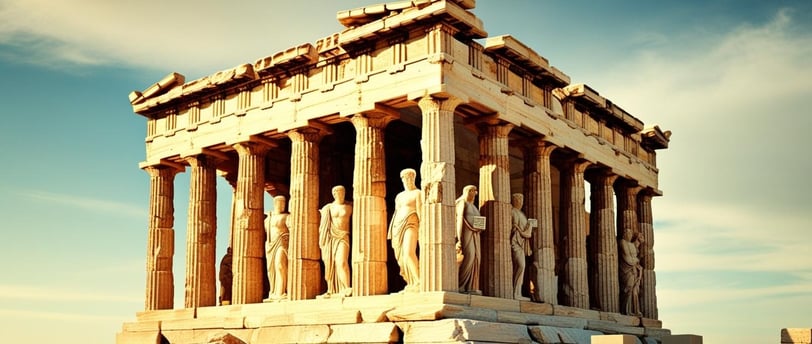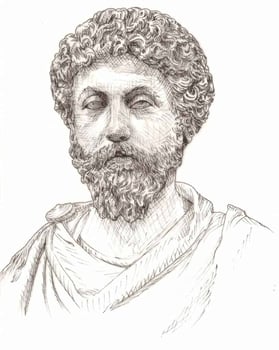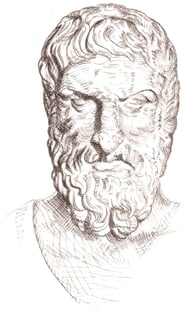Stoicism in the modern age
A short dive into the world of the stoics.
LIFE ADVICELEBENSRATGEBER


Stoicism in the modern age
Stoicism, or the Stoic philosophy, holds significant relevance today, especially in times of turbulent societal change—more so than ever before. But what exactly is Stoicism, and why am I writing a post about it?
This life philosophy originated around 300 BC through Zeno of Citium, a Greek philosopher. The word "Stoa" can be traced back to the term "painted porch," which essentially describes the colonnade in the Agora where he taught his students this philosophy. The philosophy describes a Stoic as someone who acts with reason and morality, maintaining the tranquility of their mind.
You might not be familiar with his name, but there is an important pioneer of Stoicism: Marcus Aurelius—a Roman emperor from 161 to 180 AD. In his "Meditations," which could also be interpreted as teachings from a diary, Marcus Aurelius recorded his wisdom, outlining his personal path as a Stoic. When I read his reflections, I realized how much weight his wisdom still holds today. Many, if not all, people have their own burdens to bear in life. But not only that: unforeseen circumstances and events can drastically change our lives in an instant. In these moments, it is up to us to either cling to the past or develop new strategies to make life more bearable. Ultimately, it's not just our private problems that exert pressure on us, but also our environment. Social media, for example, suggests that by the age of 19, one should already own a Bugatti and a business, or dictate what is healthy and what is not. In a world overflowing with information, it's easy to get lost and fall behind. The consequences range from "doomscrolling" to depression.
What got me into Stoicism?
But how exactly did I become aware of this philosophy? There's a short answer: Andrew Tate. You may not like him or his statements, but his charismatic nature has swept through the internet like a storm in recent years, and today there are hardly any people in my generation who don't know him. In his videos, he often makes controversial statements that have earned him his fame. In some of his videos, he frequently mentions that he considers himself stoic and that this has helped him develop his "iron will" and resilience against bad events in life. I was intrigued by what Stoicism is all about and how I could apply this life philosophy to my own life.
Being stoic means mastering negative emotions through logic and self-discipline. Many inspiring quotes from Marcus Aurelius follow the same pattern: Life is fleeting, so it's simply not worth wasting energy on doubt, fear, or anger. I would like to reinforce this with some quotes from the book "Meditations" by Marcus Aurelius. His quotes often make one's head spin because they are formulated in an archaic manner and leave room for speculation, which isn't necessarily a bad thing. Even if you don't immediately understand these quotes, it doesn't hurt to delve deeper into them. The ultimate goal of every person is to be happy. But happiness is always subjective and depends on the individual—what happiness means to me might not mean the same to you. Therefore, Stoics largely lived with minimal dependence on material things. The less someone has of something, the less they will miss having had it. Desires, in this context, always reveal a certain dissatisfaction with the present situation. And the aim of Stoics, as mentioned, is to avoid negative emotions. Thus, it makes sense to reflect on what one truly needs and wants in life. I will provide some food for thought on this later.
Primarily, I want to focus this blog post on three quotes from Marcus Aurelius, while also giving a brief insight into the philosophies of Epictetus and Seneca.
"It is not easy to see that someone is unhappy because they do not pay attention to what is happening in the soul of another; on the other hand, those who do not follow the movements of their own soul with their thoughts must necessarily become unhappy."
- Marc Aurel


It is important to be acutely aware of one's surroundings in life and to support people when they are struggling. In a narrower sense, it's about humanity and compassion, which we must continually bring to light to nurture friendships and relationships. I recently had a great conversation with someone who asked me, "How are you really?" It's just one word that determines the weight this question carries for the person. In that moment, I was deeply touched because, in my experience, only a few acquaintances and friends ask how one is really doing. And that's exactly where Marcus Aurelius's first sentence comes in: Pay attention to what is happening in the soul of another.
The second sentence states that you can only be happy if you not only care for others but, more importantly, ask yourself what you can do to find happiness in life. But that's easier said than done, as we all have our vices to bear, and perhaps things from the past that prevent us from being happy. Maybe it's fantasies or future thoughts that scare us. In this sense, it's up to you to question how honest you are with yourself and what you might be repressing. Only those who are masters of their own emotions and understand themselves will, according to Marcus Aurelius, lead a happy life. This is a lifelong process in which one must regularly engage in sincere self-dialogue.
"Put aside everything else, hold on only to these few things, and remember that each of us lives only in the present moment—a mere instant. The rest of time is either already lived or lies in the unknown. Therefore, what each person lives is insignificant, as is the corner of the earth where they live, and even the most extensive posthumous fame is insignificant."
- Marc Aurel
Memento Mori—remember that you are mortal. Life is fleeting, and we all die someday. In two centuries, there will be the last people who will ever mention your name. Your achievements, your experiences, and even the decisions you've made in life—whether good or bad—will be forgotten. So why should one be deterred from doing things one inwardly longs for? This has much to do with societal expectations, one's childhood, and new experiences that continually present us with challenges and decisions that can hold us back. It ranges from changing jobs to deciding on the love one wants to fight for. As far as each of us knows, we only have this one life. A game we can only lose in the end. It sounds a bit depressing, but when one keeps this transience in mind, it quickly becomes clear that ultimately, no one wants to say on their deathbed, "If only I had said/done/made this..." It shows strength of character to stand up for the things one truly wants in life. According to Marcus Aurelius, it shouldn't matter where you come from or what your life circumstances are. After all, they don't have to be financial decisions; often, it's the emotional issues that make us either happy or unhappy.
"If you, obedient to reason, diligently, energetically, and kindly pursue what lies before you to do, without looking to any side, and keep your divine part pure, as if you had to give it back immediately; if you hold to this, expecting nothing and fearing nothing, but satisfied with your present natural activity and heroic truthfulness in every word and sound you utter, you will live happily. And there is no one who can prevent this."
- Marc Aurel
The last quote I want to discuss deals with Marcus Aurelius's view of what makes a Stoic. We all have our own norms, values, and moral standards deeply ingrained within us. Marcus Aurelius speaks of a healthy reason that we must follow. In a narrower sense, this means that every person should be free from emotions that embitter us. Excessive greed, hatred, envy, anger, and deceit are emotions that a Stoic should never indulge. Being in healthy reason means making decisions free from these emotions, in harmony with oneself and one's love for truth. In other words: Be rational sometimes. Morality also plays an important role—for those who act against their own moral compass or their "genius" will quickly become unhappy and doubt themselves. It should be noted that no one can claim to have always acted morally correctly. Nevertheless, the actions and words of every Stoic should align with their inner attitude—be authentic. The inner attitude always describes the good in the person themselves, seeing them fundamentally as a positive being striving for good deeds. The greatest virtues are justice, wisdom, courage, and moderation, which one should try to harmonize.
This was a brief insight into the wisdom of Marcus Aurelius. Two other Stoics, Seneca and Epictetus, should not be overlooked here. Although all three are representatives of Stoicism, they differ in their perspectives due to their life circumstances.
Epictetus was a slave who lived around 50–135 AD. His teachings, written in small "handbooks," are described as the meaningfulness of self-discipline. The core idea of his perspective differs in two aspects: There are things in life that are within our control and things that are beyond our control. Things within our control are intrinsic. These are our thoughts, judgments, and actions. We are responsible for how we react to an unpleasant situation or how we want to behave in certain settings. Beyond our control, on the other hand, are all extrinsic influences like wealth, social status, and health. We can only influence these to a certain extent, but there's no guarantee that anyone can control these influences 100%. No one can choose the family they are born into. Applying Epictetus's perspective to today, his views hold great relevance—not just back then.
"It's not the things themselves that disturb people, but their opinions about the things." - Epictetus


This is one of his quotes that shows how we often ask ourselves in everyday life what others might be thinking about us at the moment. There's a simple reason for this: From an evolutionary biology perspective, it was important for people in a tribe to reflect on their own behavior and recognize how others thought of them, as it was crucial for survival. Without the tribe, a lone cave person had little chance of surviving in nature. Therefore, one could see this thinking as a primal instinct trying to remain part of a community.
In today's context, this way of thinking is still relevant, but we are no longer existentially dependent on a "tribe" to survive. I know some people who often worry about the opinions of others, not only letting themselves be unsettled but also mentally burdened. And this is where Epictetus picks up where Marcus Aurelius leaves off: The opinions of others are important, but if you take them too personally or see them as a kind of attack, then it's poison for your soul. One must not forget that they are just opinions and say more about the other person than about oneself. Sometimes one falls into a "spotlight effect," making it seem as if people are much more focused on the flaws and problems of others. But this is not true in most cases, as everyone lives their own life and faces their own challenges and problems that consume their energy. Everyone sees themselves as the main character in life because, let's be honest, only each individual knows that they exist—with all their feelings and emotions, consciousness, and individual experiences. And this inner consciousness makes it inevitable that one constantly thinks about oneself rather than others. In fact, everyone is too preoccupied with themselves, as we spend our entire lives in our own heads. We can assume how someone else feels, but even these are just assumptions deeply linked to similar experiences within us. Long story short: The opinions of others are based on a subjective assessment of themselves and should not be taken as an all-encompassing truth.
A well-known figure in Stoicism is Seneca, who lived around 4 BC–65 AD and was a Roman statesman and writer. Compared to the other two Stoics, Seneca dealt with ethical dilemmas and moral responsibility. He saw wealth, for example, not as an obstacle to virtue, as long as one does not cling to it too much. So, someone who is rich or strives for wealth is not necessarily a bad person, as long as they do not lose themselves in greed. Seneca's perspective has a very pragmatic approach, meaning it deals more with everyday life. In his letters, he emphasized views on many areas of life, such as time, serenity, death, friendship, and ethics. The easiest to grasp here is time, as Seneca emphasizes:
"It is not that we have a short time to live, but that we waste a lot of it." - Seneca


Time runs through our entire lives, from the day we are born. Before that, time was relative, and after that, it remains so. Time is not the future or the past, but the present. And the present is all we have. Seneca emphasizes in this case that we should not only appreciate the small moments in life but also do everything in our power to slow down time. This happens especially when we gain new experiences or learn something new.
I find the comparison of the perception of time in relation to his quote on death particularly fascinating:
"Each day we should live as if it were our last." - Seneca
These are words we have all heard before. And this quote comes from him. But too rarely do people become aware of their mortality and either live bitterly in the past or anxiously in the future. But the present moment, right now, as you read these words, is all you have. No one has written on their forehead how long they will live. Tomorrow could already be over, and yet one has not said the things that needed to be said; realized the life dreams one strives for, or tried the things and ideas one is interested in.
Stoic Questions for Yourself
The last topic of this blog includes questions for yourself that can help you integrate the views of the Stoics into your life. Take a piece of paper and a pen, sit at your desk with a cup of tea, turn on a small reading lamp, and reflect. And if you don't feel motivated, just take these questions as food for thought.
What things can I control in my current situation, and what can't I control?
What would my life look like if I focused only on what is within my power?
What would be the most rational and virtuous solution to deal with a situation that is currently burdening you?
Am I living according to my own principles, or am I guided by external expectations?
How can I use my time meaningfully instead of wasting it on unimportant things?
Is what I see as a problem perhaps an opportunity for inner strength?
Answering these six questions takes some time, and I too have had to think long and hard to come up with answers. But the more a person reflects on and seeks to understand their inner emotional world and thoughts, the easier this process becomes.
Integrating Stoic wisdom into everyday life not only teaches you to better handle stress or impulsive emotions but ultimately leads to emotional resilience (resilience) in the face of crises, defeats, and difficult situations. For example, if you get rejected for a job or fail an exam, you see it as a learning moment rather than a catastrophe. Being Stoic will lead you to focus on the essentials in life and not stray from your path. Distractions are okay as long as they don't take over. Instead of excessive phone consumption, this energy can be much better invested in personal development. New hobbies, nurturing relationships, sports, or reading are all things that can contribute to this.
Impulsive emotions also diminish as you regularly reflect on and thus guide them. Instead of taking criticism or an opinion personally, one can ask: "Is this true? What can I learn from this? What does this say about the other person?" Of course, it's important not to reduce all criticism to the "emotional world" of the other person, but it helps to understand concrete opinions. Moreover, through a Stoic life path, you will realize that material things are not everything in life to be happy. Rather, it's about your inner attitude, not external influences. A Stoic would enjoy prosperity but not be obsessed with it. The last and, for me, most important point is Memento Mori, the awareness of mortality.
We live only a brief moment on this Earth, so why should one make life harder for oneself because of the opinions of others? Even the fear of failure or rejection is, in the grand scheme of life's transience, quite irrelevant. Instead of fearing change, one simply perceives it as part of life. And that's just how life is—a rollercoaster with ups and downs.
As always, thank you for reading this post to the end. In the future, there will be many more ,,deeper" topics I want to address.
